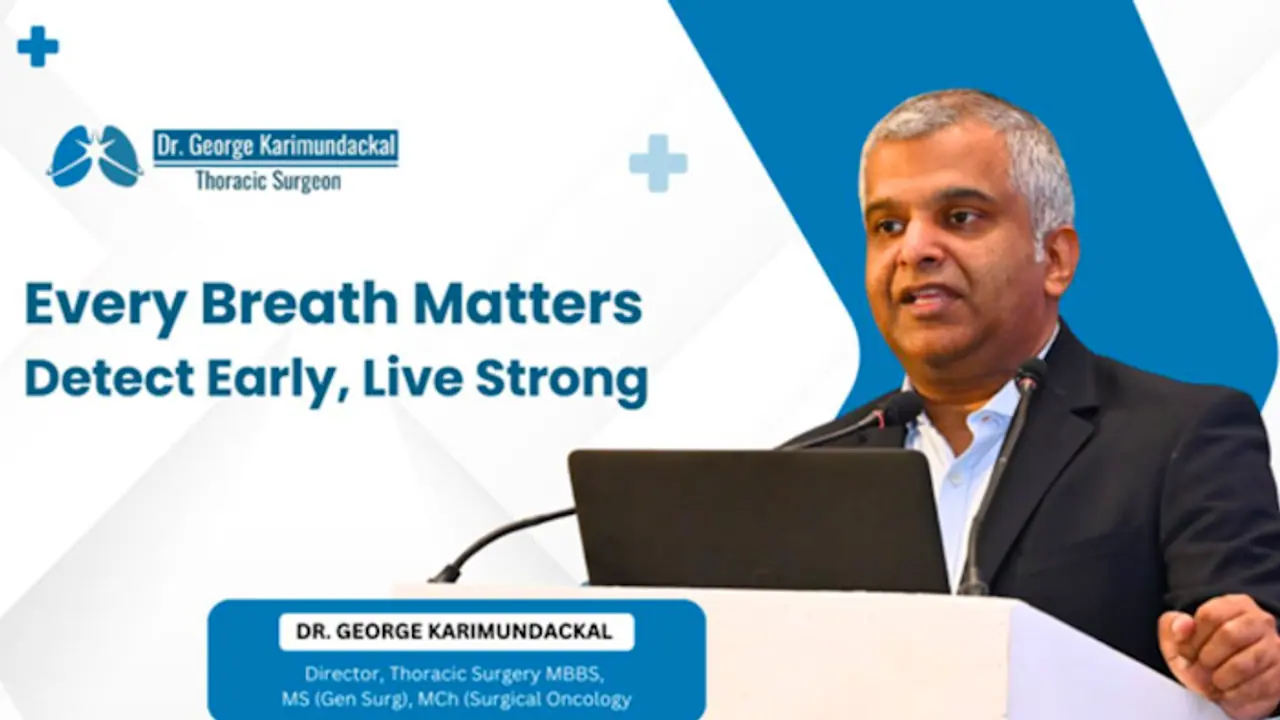Dr. George is one of India’s leading authorities on minimally invasive thoracic surgery, including robotic-assisted thoracic surgery (RATS), video-assisted thoracoscopic surgery (VATS), and single-incision thoracoscopy (U-VATS).
In the ongoing battle against cancer, lung cancer remains one of the most formidable adversaries, accounting for a significant percentage of cancer-related deaths globally. According to the World Health Organization (WHO), lung cancer claims the lives of more than 1.8 million people every year, making it the leading cause of cancer mortality worldwide. In India, this trend is equally alarming, with the Indian Council of Medical Research (ICMR) reporting that lung cancer accounts for 6.9% of all new cancer cases and 9.3% of cancer-related deaths annually. These statistics underscore a critical truth: early detection can make all the difference.
Dr. George Karimundackal, a renowned Lung Cancer Specialist in Mumbai, is spearheading the fight against this deadly disease through a combination of advanced diagnostics, cutting-edge surgical procedures, and a firm commitment to patient education. Currently serving as the Director of Thoracic Surgery at Nanavati Max Super Speciality Hospital, Dr. George is one of India’s leading authorities on minimally invasive thoracic surgery, including robotic-assisted thoracic surgery (RATS), video-assisted thoracoscopic surgery (VATS), and single-incision thoracoscopy (U-VATS).
“Lung cancer is often diagnosed late because its symptoms—persistent cough, chest pain, breathlessness—are frequently mistaken for less serious conditions,” explains Dr. George. “This delay can be life-threatening. The earlier we can detect the cancer, the better the patient’s chances of survival.”
Supporting this statement, a study by the Lung Cancer Research Foundation shows that when lung cancer is detected at an early stage, the five-year survival rate increases dramatically to 56%, compared to just 5% in later stages. To this end, Dr. George advocates for widespread adoption of low-dose computed tomography (LDCT) scans, particularly for high-risk groups including smokers, individuals exposed to industrial pollutants, and those with a family history of lung disease.
With over 15 years of experience and more than 1,000 minimally invasive thoracic procedures to his credit, Dr. George has seen firsthand the life-saving potential of early intervention. His expertise extends beyond standard lung cancer surgery to complex procedures such as tracheal reconstructions, mediastinal tumor excisions, and esophageal resections—many of which are conducted with the support of cardiopulmonary bypass when necessary. “Our goal is to offer each patient not only hope, but a real path to healing through the most advanced, least invasive means possible,” says Dr. George.
Technological innovation plays a crucial role in that mission. At Nanavati Max Hospital, Dr. George leads a multidisciplinary team of thoracic anesthetists, interventional pulmonologists, and cardiovascular surgeons. Together, they utilize robotic-assisted systems that offer enhanced precision, flexibility, and visibility during surgery—translating into smaller incisions, less postoperative pain, and faster recoveries. “Minimally invasive surgery has revolutionized thoracic care. Patients now spend fewer days in the hospital and return to their normal lives much sooner than with traditional open surgery,” he adds.
Beyond surgery, Dr. George emphasizes the growing role of targeted therapies and immunotherapy in treating advanced-stage lung cancers, especially in patients who are not ideal surgical candidates. “These therapies allow us to personalize treatment based on the molecular profile of the tumor, leading to better outcomes with fewer side effects,” he explains. “It’s a game-changer for patients who, just a decade ago, would have had very limited options.”
Yet, perhaps the most powerful tool in combating lung cancer is awareness. Environmental pollution, rising urban smoking rates, and a general lack of screening culture continue to fuel the disease’s rise. “We’re seeing more cases in younger populations and non-smokers due to factors like air pollution and genetic predisposition,” says Dr. George. “This shift makes it even more essential to dispel myths and promote proactive health checks.”
He urges individuals—particularly those over 40 or with risk factors—to get annual screenings and never ignore persistent respiratory symptoms. “If detected early, lung cancer is not a death sentence. With the right intervention at the right time, patients can go on to live full, healthy lives,” he affirms.
Dr. George Karimundackal’s work at Nanavati Max Hospital continues to inspire both his medical peers and the many lives he has touched through his practice. With his unique blend of academic rigor, surgical mastery, and human empathy, he stands at the forefront of India’s lung cancer care landscape. For those seeking reliable, compassionate, and state-of-the-art treatment, he remains a beacon of hope in Mumbai and beyond.
About Dr. George Karimundackal
Dr. George Karimundackal is a leading lung cancer specialist in Mumbai and Director of the robotic Surgery program at Nanavati Max Super Speciality Hospital. As his profile suggests, he specializes in thoracoscopic and robotic surgery.
With professional qualifications from leading institutions, Dr. George has a rich experience of over 15+ years in thoracic surgery.
His previous associations include being a former professor of thoracic surgery at Tata Memorial Hospital, Mumbai, and treasurer of the Indian Society of Stomach and Esophagus Surgery (ISES). He has also contributed to clinical trials and studies on thoracic and lung cancer treatment, improving surgical techniques and outcomes.
Dr. George K performs lung surgeries, oesophageal surgeries for cancer, chest wall tumour removal, and robotic surgeries for chest diseases. With excellent outcomes, he has earned a reputation for being the best in his profession.
Schedule a Consultation
Call +91-85913 90567 to book an appointment.
To meet Dr. George K, you can visit him in Nanavati Hospital at:
Nanavati Hospital Ground, 18, LIC Colony, Suresh Colony, Vile Parle, Mumbai, Maharashtra 400056


